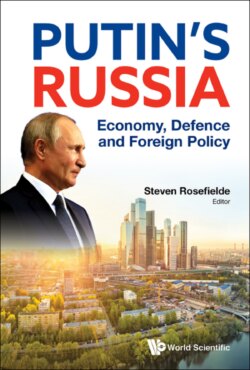Читать книгу Putin's Russia - Группа авторов - Страница 44
На сайте Литреса книга снята с продажи.
Conclusion
ОглавлениеThe global competitiveness of Russia’s economy remains low and its features as a petrostate have intensified in recent years. Russia’s banking sector has limited impact on domestic economic activities because it has failed to provide investment to foster long-term economic development and modernisation. The corporate sector finances itself from retained earnings or from international capital markets. Russian banks are active borrowers of these cheap loanable funds, but foreign sanctions now limit their access.
Ruble devaluation, plummeting petroleum prices, rising inflation, geopolitical instability and international sanctions aggravated liquidity problems in the banking sector and destabilised Russia’s economy in the years 2014–2018. The problem still persists.
The negative trends of 2014–2018 caused massive bankruptcies, license revocations due to dubious transactions, money laundering, tax evasion and mounting non-performing loans. The Bank of Russia’s exposure of asset-stripping activities, overstated asset value and inflated their capital structures highlight institutional flaws of Russia’s banking system and underscore the need for radical reform.
First, the Bank of Russia’s supervisory role requires fresh attention in light of past failures. The Otkrytie “too big to fail” problem provides a clear case in point. The “clearance campaign” of the Bank of Russia initiated in 2013 is a positive sign, but does not seem sufficient to preclude massive future bank insolvencies.
Second, private banks need to improve their performance as intermediaries, in part by curtailing their investments in corporate and sovereign bonds. The state can mandate private banks to increase their activities as intermediaries, and can reduce interest paid on sovereign debt.
Third, the government should monitor Vneshekonombank’s operations more closely to avoid further losses.
The idiosyncratic features of Russia’s banking sector such as substantial state participation and strong linkages with industrial groups are likely to persist. The extensive, strong and rigid participation of the state in Russia’s banking sector is inherited from the Soviet banking system, together with the strong functions of the Bank of Russia, a successor of Gosbank from the monobank system. Linkages with industrial groups have been transformed into banking holdings and continue serving the interests of the wealthy oligarchs rather than the real sector of the economy. In general, banks’ role as intermediaries in the financial market remains limited.
The role of the state in the banking sector need not be detrimental. Russia may be able to achieve satisfactory results if the government prioritises long-term investments essential for further economic development and modernisation. Banks must be compelled to improve their intermediary function as providers of basic finance. However, for the moment it seems that this is not happening. The intensifying state effort to bail-out systematically important banks is impairing competition and discouraging foreign banks from expanding their operations.
